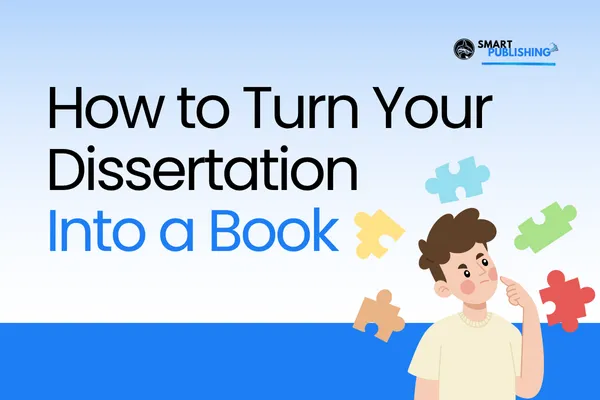
How to Turn Your Dissertation Into a Book (and Actually Make It Readable)
How to Turn Your Dissertation Into a Book (and Actually Make It Readable)
📘 Smart Publishing Impact Series – Episode 37
If you’ve ever written a dissertation, you know it’s no small feat. You’ve spent years researching, analyzing, and compiling data—only for the final product to sit on a shelf (or a university database) gathering dust.
But what if you could take all that hard work and transform it into a published book—one that reaches a wider audience, impacts lives, and positions you as an expert in your field?
At Smart Publishing, we’ve helped countless academics do just that. Turning a dissertation into a book isn’t about starting over—it’s about reshaping what you’ve already created so it connects with real readers.
Here’s how to make the transition.
🎯 Step 1: Redefine Your Audience
Your dissertation was written for an academic committee. Your book should be written for a reader.
That means rethinking your primary audience (who you’re writing for) and possibly identifying a secondary audience (who else could benefit).
If your dissertation explored leadership in ministry, maybe your book is meant for pastors and church leaders—but could also inspire everyday believers interested in faith-based leadership.
Focus your message. If you try to talk to everyone, you end up connecting with no one.
✍️ Step 2: Change Your Narrative Style
Academia teaches you to write in the third person: “The author argues…” or “The researcher found…”
That’s fine for a committee—but awkward for readers. For your book, switch to first person. Make it conversational. Make it feel like you’re sitting across from your reader, explaining your insights over coffee.
Readers don’t connect with “The Author.” They connect with you.
📚 Step 3: Simplify Your Language
Let go of the need to sound “academic.” The goal is to educate and engage, not impress.
Studies show the average reading level of most adults is around eighth grade. Writing with accessible language doesn’t dumb down your ideas—it makes them more powerful and digestible.
Think clarity, not complexity. If you wouldn’t say it in conversation, don’t write it that way in your book.
🧾 Step 4: Handle References Differently
Dissertations rely on in-text citations (e.g., “Smith, 2022”). But that’s visually distracting and kills the reading flow.
Instead, use superscript numbers for references and list them at the end of each chapter or at the back of the book. This method honors your sources without overwhelming your reader.
Remember, your reader wants to understand your research—not decode it.
🧩 Step 5: Rethink the Structure
Dissertations are structured for academia: double-spaced, formal headings, rigid sections. Books are structured for readability.
When adapting your dissertation:
Use 1.15 line spacing instead of double.
Include subheaders to break up long sections.
Add callout boxes and pull quotes to highlight key insights.
Incorporate visuals—charts, images, or graphics—to make concepts easier to grasp.
And yes, please stop using double spaces after sentences. That’s a leftover from the typewriter era!
💡 Step 6: Bring in Storytelling
Academic writing explains; books connect.
Add stories, real-life examples, and anecdotes to bring your ideas to life. Readers remember stories far more than statistics. Whether you’re explaining a theory or summarizing data, ask yourself:
“How can I make this feel human?”
That’s what turns information into transformation.
🏁 Step 7: Keep a Consistent Chapter Flow
Every chapter should follow a familiar rhythm. For example:
1️⃣ Start with a story or real-world example.
2️⃣ Teach your main point or research takeaway.
3️⃣ End with practical insights or reflection questions.
Consistency builds trust. It helps readers stay engaged and navigate your content easily.
📘 Final Word
Converting your dissertation into a book isn’t about abandoning your academic rigor—it’s about translating your brilliance for a broader audience.
You already did the hard part: the research. Now it’s time to make that work matter beyond the classroom.
Keep writing your story—because the world needs your voice.
—Renee
